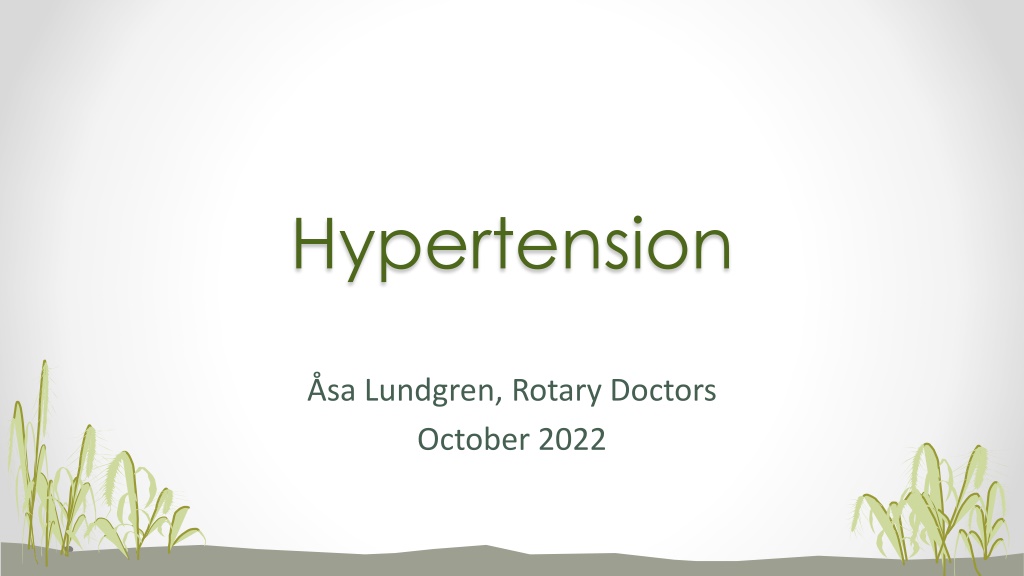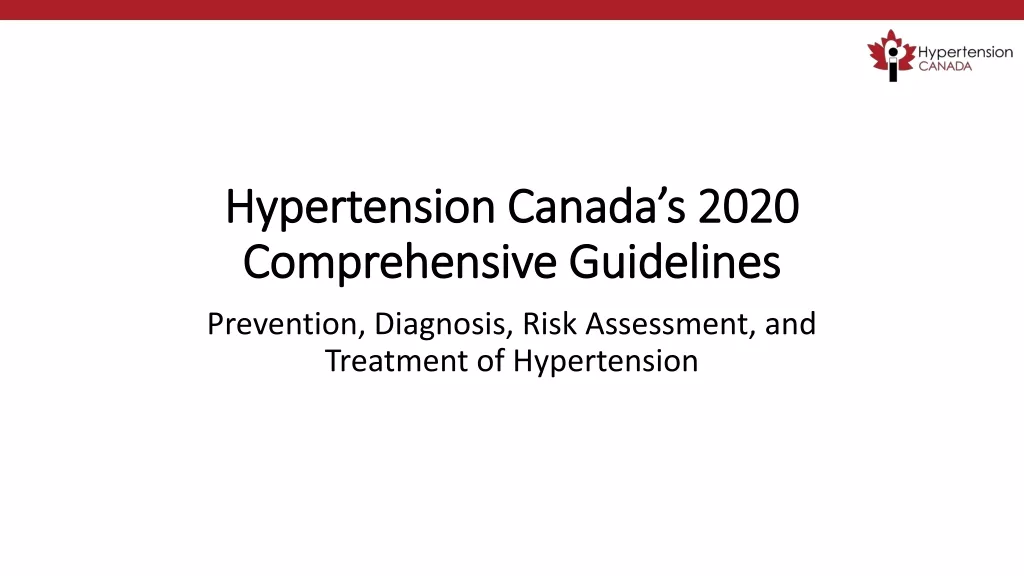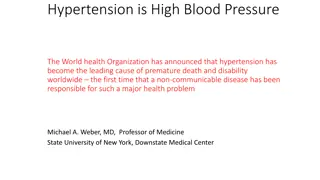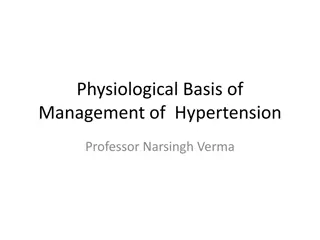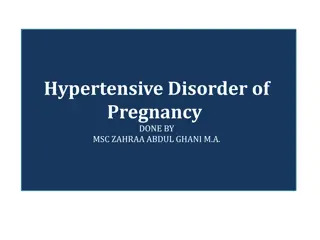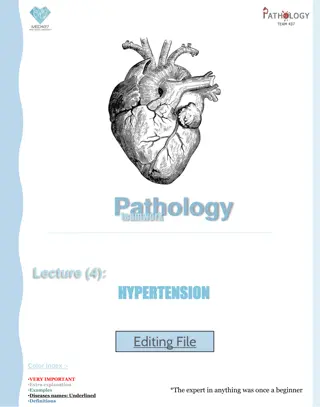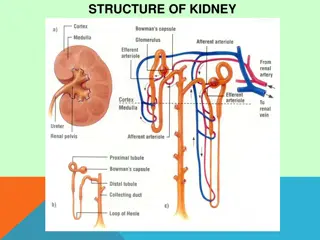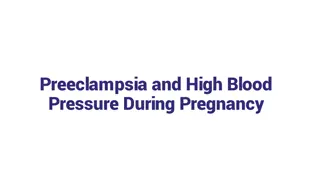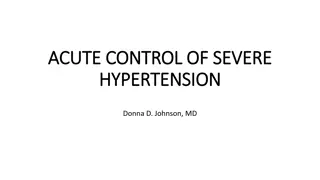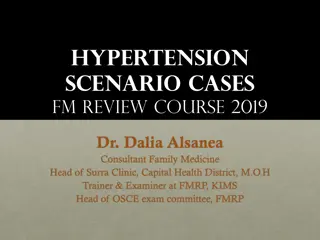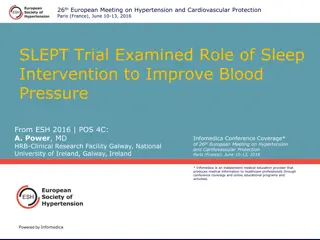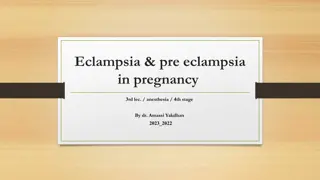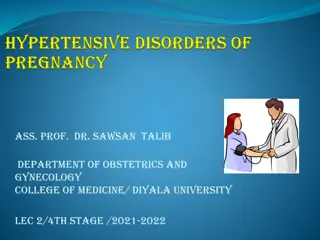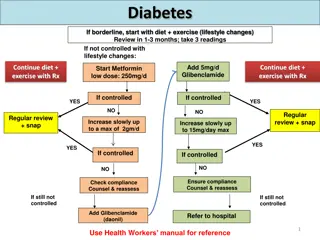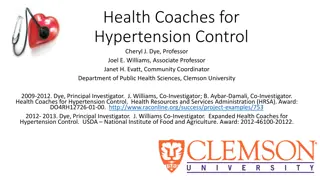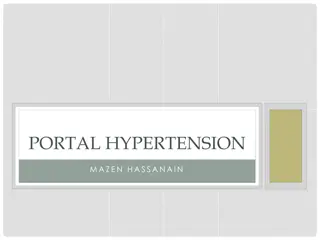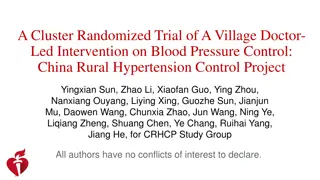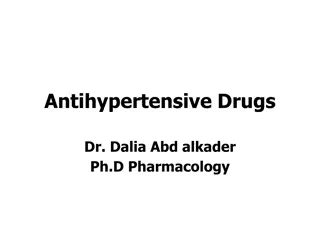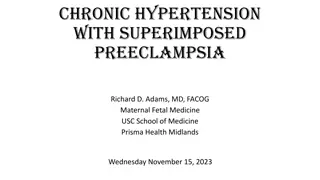Understanding Hypertension: Causes, Symptoms, and Management
Blood pressure is the force of blood against the artery walls. Hypertension, or high blood pressure, can lead to serious health risks like heart disease, stroke, and kidney failure. Primary hypertension may be caused by factors like heredity, obesity, and stress, while secondary hypertension can be due to conditions like kidney disease or pregnancy. Symptoms can be subtle, but it's crucial to monitor blood pressure regularly. Lifestyle changes, such as weight loss, exercise, and a balanced diet, can help manage hypertension effectively.
Download Presentation

Please find below an Image/Link to download the presentation.
The content on the website is provided AS IS for your information and personal use only. It may not be sold, licensed, or shared on other websites without obtaining consent from the author. Download presentation by click this link. If you encounter any issues during the download, it is possible that the publisher has removed the file from their server.
E N D
Presentation Transcript
Hypertension sa Lundgren, Rotary Doctors October 2022
What is blood pressure? The pressure of the circulating blood on the vessels. Systolic: When the heart contracts. Diastolic: When the heart rests between two beats.
What is high blood pressure/hypertension? >140/>90 Persistently elevated blood pressure in the arteries. Increased pressure on the vessel walls. Hardening and thickening of the arteries = stiff arteries. The heart needs to work harder.
Why is hypertension dangerous? Increased risk f r heart disease, including infarction Increased risk of stroke Increased risk of hypertensive renal failure Retinpathy Vascular dementia
Causes of primary (essential) hypertension Hereditary Overweight NaCl-consumtion Stress Age Atherosclerosis Diabetes
Secondary hypertension 5-10% Hyperaldosteronism Medication (steroids, NSAID etc) Caused by another disease: Diabetes Kidney disease Pregnancy Endocrine dieseases
Symtoms of hypertension Most often no symtoms! Headache Shortness of breath Nosebleed Blurred vision Buzzing in the ears
To measure blood pressure Sit or lay down 5 minutes rest No coffee or tobacco for 30 min At least once in both arms Recheck if high Pulse? Irregular?
What can the patient do? Reduce weight if BMI > 25 Physical activity Fruits and vegetables Reduce salt intake Reduce alcohol
When to start medication? > 180/110 (check again after some rest): Amlodipin 5-10 mg OD. Control after 1-2 days. When patient has tried diet, physical activity etc and still . < 80 years: > 140/90 > 80 years: > 160/90. If known cardiovascular disease, diabetes, kidney disease > 130/85
Before starting treatment Blood tests: Na, K, creatinine, lipids, HbA1c/fasting B-glucose Urine dipstick ECG Treatment should start even if testing is not available.
What to start with? Start with 1-2 from these 3 groups: Calcium-antagonists (Amlodipin) Thiaziddiuretics (Hydrochlortiazid) ACE-inhibitors (Enalapril, Ramipril) och ARB (Losartan)
Calcium-antagonists Relaxes the muscles in the vessel walls. The safest if blood tests can t be taken. Amlodipin 5 10 mg OD Felodipin 5 10 mg OD
Thiazidduiretics Makes the kidneys get rid of water and salt and widens the small blood vessels. Risk: Too high doses can reduse potassium. Hydrochlortiazid 12,5 25 mg OD Bendroflumethiazid 2,5 mg OD
ACE-inhibitor or ARB Diabetes, heart failure, renal failure. Widens vessels. Angiotensin converting enzyme inhibitor (enalapril 5 20 mg OD, ramipril, captopril): Common side-effect: Coughing. Angiotensin II receptor blockers (losartan 50 100 mg OD, candesartan):
Follow-up Every month until <140/<90 is reached. Increase doses and add medicines until maximal doses of the three groups. Then every 3rd 6th month (WHO). Yearly (Sweden): Blood tests.
If <140/<90 is not reached Betablockers (metoprolol, atenolol): Blocking the effect of adrenalin/noradrenalin. Especially when chronic ischemic heart disease. Loopdiuretics (furosemid): Especially if fluid retention. Aldosteronantagonists (spironolacton) Alfablockers
How to succeed? A well-informed patient! What medicine should I take? Why? Life long medication What can I do myself?
